Unit 5 What an adventure! Listening & speaking 课件(共26张,内嵌视频)2024-2025学年高一英语外研版(2019)必修3
文档属性
| 名称 | Unit 5 What an adventure! Listening & speaking 课件(共26张,内嵌视频)2024-2025学年高一英语外研版(2019)必修3 | 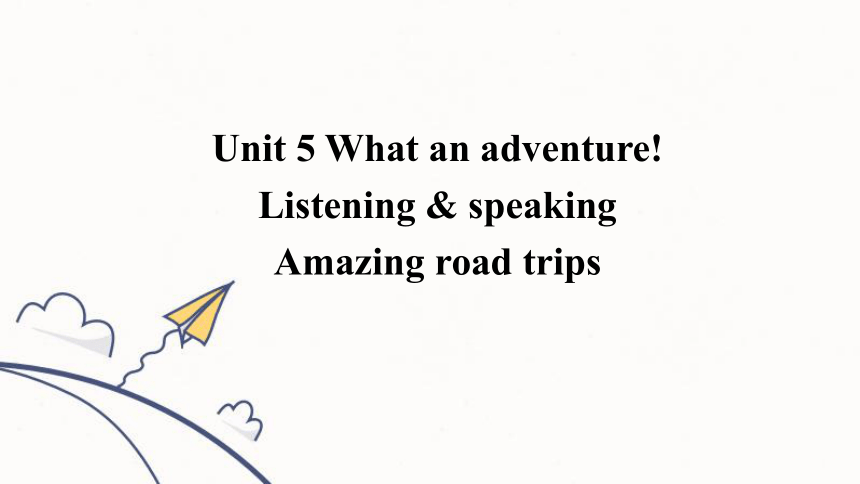 | |
| 格式 | pptx | ||
| 文件大小 | 15.6MB | ||
| 资源类型 | 教案 | ||
| 版本资源 | 外研版(2019) | ||
| 科目 | 英语 | ||
| 更新时间 | 2025-05-02 15:41:38 | ||
图片预览

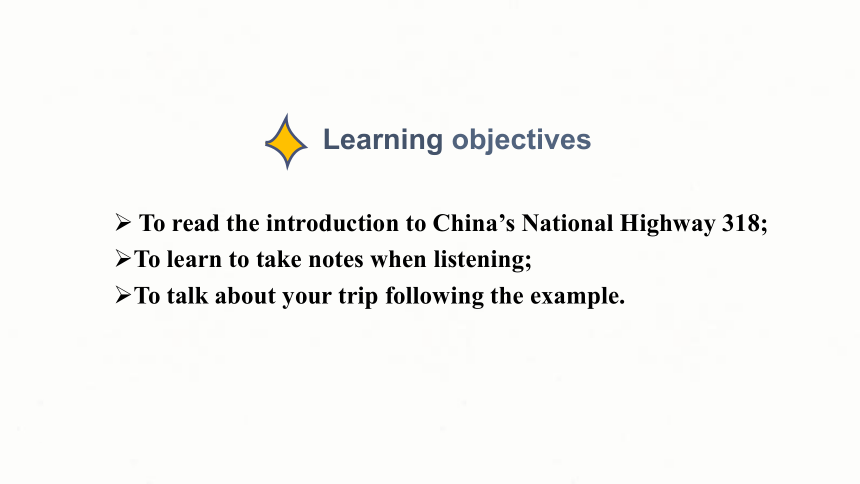
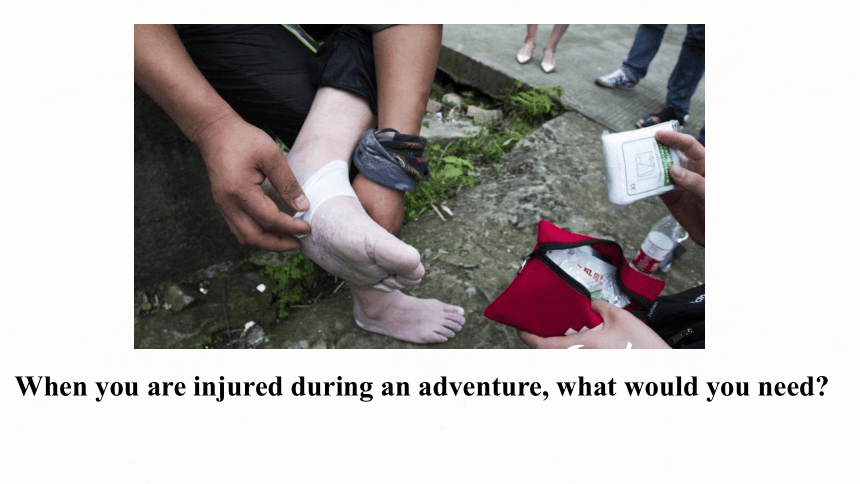
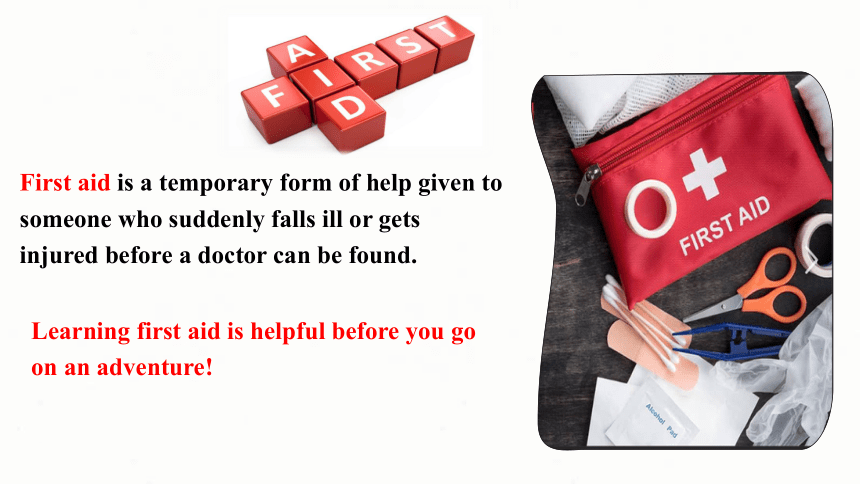
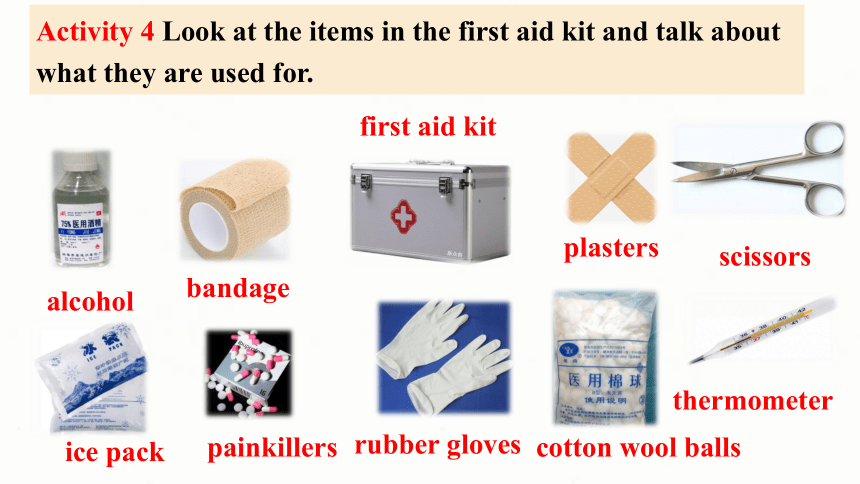
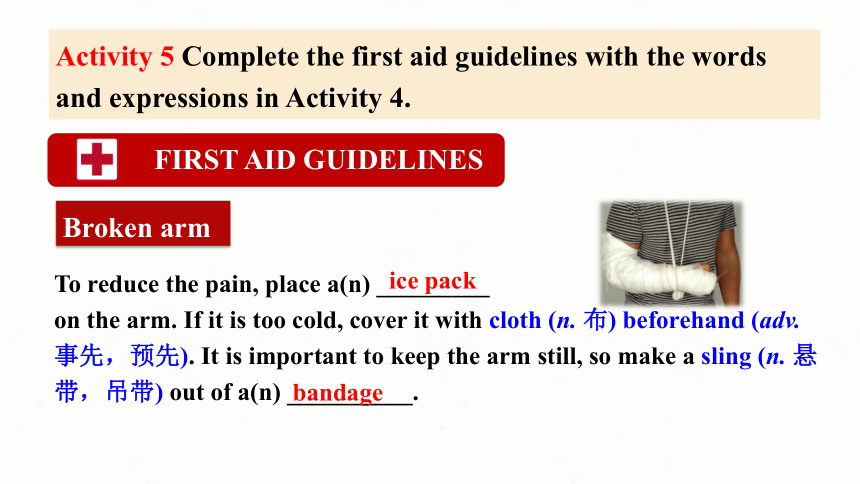
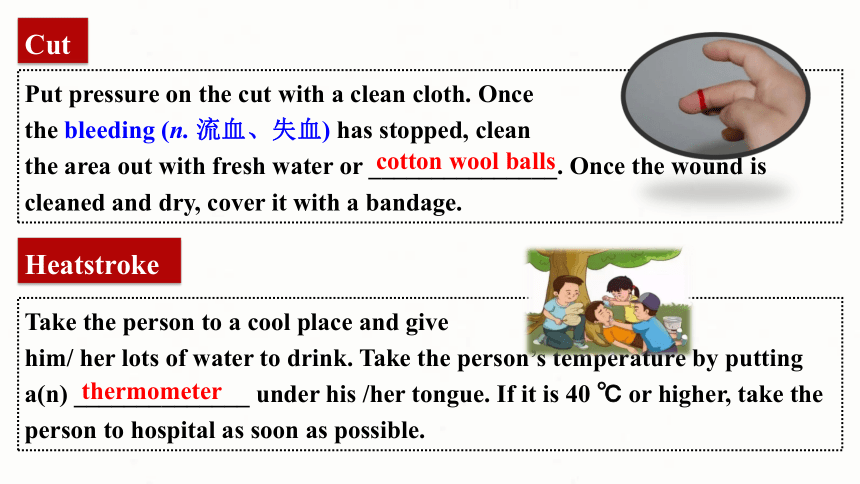
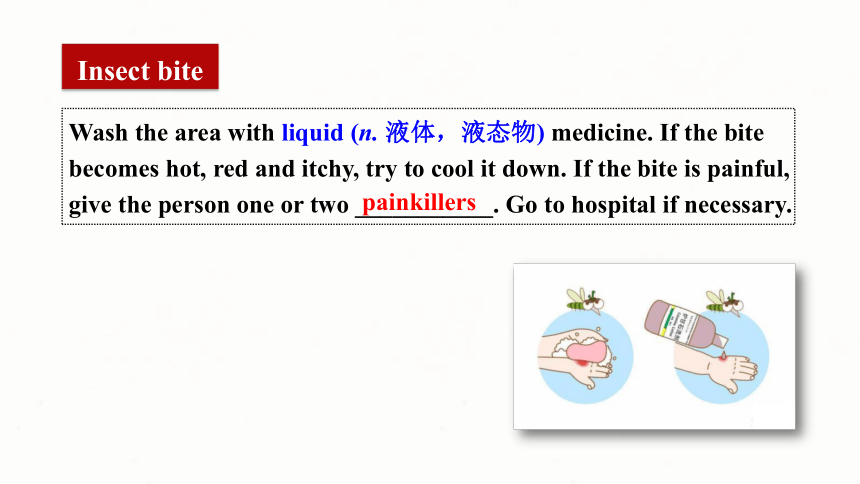
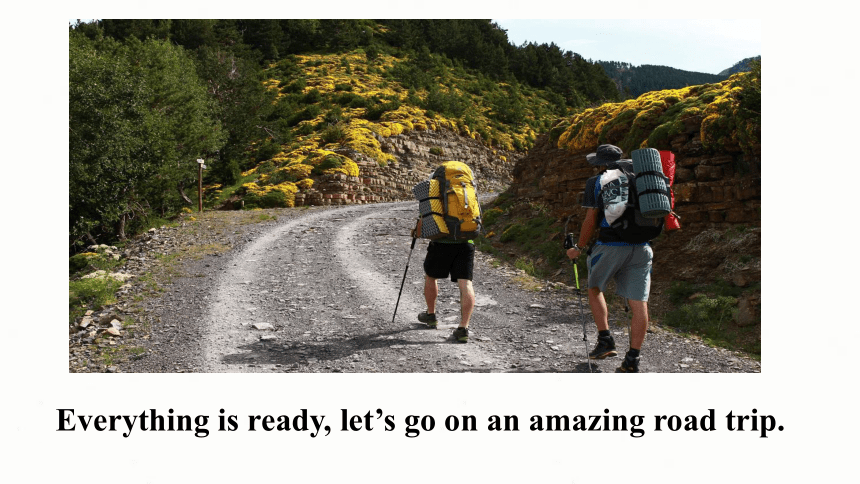
文档简介
(共26张PPT)
Unit 5 What an adventure!
Listening & speaking
Amazing road trips
To read the introduction to China’s National Highway 318;
To learn to take notes when listening;
To talk about your trip following the example.
Learning objectives
When you are injured during an adventure, what would you need
First aid is a temporary form of help given to someone who suddenly falls ill or gets injured before a doctor can be found.
Learning first aid is helpful before you go on an adventure!
first aid kit
bandage
plasters
painkillers
cotton wool balls
Activity 4 Look at the items in the first aid kit and talk about what they are used for.
alcohol
ice pack
rubber gloves
scissors
thermometer
Activity 5 Complete the first aid guidelines with the words and expressions in Activity 4.
To reduce the pain, place a(n) _________
on the arm. If it is too cold, cover it with cloth (n. 布) beforehand (adv. 事先,预先). It is important to keep the arm still, so make a sling (n. 悬带,吊带) out of a(n) __________.
ice pack
bandage
Broken arm
FIRST AID GUIDELINES
Put pressure on the cut with a clean cloth. Once
the bleeding (n. 流血、失血) has stopped, clean
the area out with fresh water or _______________. Once the wound is cleaned and dry, cover it with a bandage.
cotton wool balls
Cut
Take the person to a cool place and give
him/ her lots of water to drink. Take the person’s temperature by putting a(n) ______________ under his /her tongue. If it is 40 ℃ or higher, take the person to hospital as soon as possible.
thermometer
Heatstroke
Wash the area with liquid (n. 液体,液态物) medicine. If the bite becomes hot, red and itchy, try to cool it down. If the bite is painful, give the person one or two ___________. Go to hospital if necessary.
painkillers
Insect bite
Everything is ready, let’s go on an amazing road trip.
China’s National Highway 318
What basic information of the road in mentioned
China’s National Highway 318, stretching over 5,000 km, runs from Shanghai to Zhangmu, Tibet. It is one of the longest highways in China, and perhaps the most dangerous, too. It is known as the “heavenly road”, both for its amazing views and for its role in boosting the local economy.
Challenges on the “heavenly road”
snowy weather; icy roads
bad road conditions; landslide (塌方)
high altitude; altitude sickness (高原反应)
Amazing road trips
1 Expensive but fun
2 Difficult and unpleasant
3 Challenging but rewarding
Activity 7 Listen to the interview and choose the words that best describe the speakers’ experiences.
While listening, do you think it’s necessary or possible to take down every single word you hear
While listening and taking notes, you don’t need to write down every word in full. Using symbols and abbreviations can allow you to take notes more quickly. Next time you need to take notes, try using some of these: ∵/because, ∴/therefore, 5/five, ↑/up, C20/20th century, 20K/twenty thousand, diff./diffeernce.
Learning to learn
Shorthand strategy(速记策略)
Abbreviation
(缩写)
Symbol
Number
UN
diff.
$
∵/∴
5k
United nations
difference/
difficult
dollar/money
because/therefore
five thousand
一些英语单词在实际使用的过程中,有一些约定俗成的缩写方法,可以简洁明了地代替复杂的词语。
表示月份的词语 大多可以缩写为其前三个字母 January→Jan., February→Feb.
表示长度单位 centimetre →cm, kilometer →km
常用的单词和短语 for example →e.g.,
and the rest→etc.,number →No.
一些单词和词组可以借鉴数学运算中的符号来表示 equal → “=”
有一些单词可以用常见的符号代替 dollar → “$” ,and→ “&”
Activity 8 Listen again and complete the blog.
When we came back, we were asked a lot of questions
about our adventure. Here we’ll try to answer the most
frequently asked questions.
A TRIP
ALONG
HIGHWAY
318
Why did you do it
We did it to _______________________________.
How did you prepare
We really practised a lot! If we weren’t studying, we were _______.
raise money for a children’s charity
cycling
What difficulties did you encounter
We had to ____________________ day after day. We also had to face ______________ and dangerous falling rocks. _________ started from Chengdu, but three friends got injured.
cycle up mountains
snowy weather
Five of us
How did you feel after the trip
It was the best feeling in the world! We had an adventure, raised some money and _______________________ to some children’s lives.
What did you see
The views were fantastic! The most impressive ones were those of ____________________.
the snowy mountains
helped make a difference
Interviewer: Today I’m talking to Wang Tao and Zhang Jing, who have cycled China’s National Highway 318. Welcome, guys! Now, many young people just want to spend their free time playing and having fun. Instead, you’ve completed a great adventure.
Interviewer: Zhang Jing, why did you do it
Interviewer: What a great idea! And how did you prepare for it
Interviewer: That’s amazing. Was the trip as difficult as you’d expected
Interviewer: Despite the difficulties, what was the best thing about your adventure?
Interviewer: And how did you feel when you reached the end?
Interviewer: Thank you for sharing your experience. I’m sure a lot of young people will be inspired by what you have done.
Analyze how the interviewer organizes the interview.
Introduction
Body
Conclusion
Today I’m talking to Wang Tao and Zhang Jing, who have cycled China’s National Highway 318. Welcome, guys! Now, many young people just want to spend their free time playing and having fun. Instead, you’ve completed a great adventure.
Thank you for sharing your experience. I’m sure a lot of young people will be inspired by what you have done.
1. How does the interviewer start and conclude the interview
Introduction
Conclusion
Interview
Greetings & Background
Thanks & Comment
Purpose
Preparations
Difficulties
Views
Feelings
Introduction
Conclusion
Interview
2. What are the functions of the words in red?
Body
Greetings & Background
Thanks & Comment
Zhang Jing, why did you do it
What a great idea! And how did you prepare for it
That’s amazing. Was the trip as difficult as you’d expected
Despite the difficulties, what was the best thing about your adventure?
And how did you feel when you reached the end?
Transitional words
(过渡语)
Comment
Response
Keeping the interview going
Useful expressions
Today I’m talking to …
Where did you …
Why did you …
How did you go/prepare/feel …
What difficulties did you encounter
What is the most/best/worst …
Did you enjoy/go to/try …
How about …
What an amazing/wonderful…
Thank you for sharing …
Interview (Pair work)
Suppose you are invited to our school’s TV station to talk about a trip you’ve taken. (Adventure trips preferred)
Step 1: Decide the role of the interview: interviewer / interviewee;
Step 2: Prepare questions and answers;
Step 3: Act out the interview.
Interview
Peer-assessment Chart Interviewer Interviewee
Introduction (proper )
Answers (clear )
Conclusion (inspiring ) Transitional words ( proper ) Improve physical health
Builds up your confidence
Reduce stress
Gain a sense of achievement
Make a difference
Strengthen will-power
Experience different lives
Learn new skills
Strengthens relationships
Increases your self-awareness
Top ten reasons to go on an adventure
Life is a daring adventure.
—— Helen Keller
Write a diary entry about a trip you’ve taken.
(no less than 80 words)
Assignment
Unit 5 What an adventure!
Listening & speaking
Amazing road trips
To read the introduction to China’s National Highway 318;
To learn to take notes when listening;
To talk about your trip following the example.
Learning objectives
When you are injured during an adventure, what would you need
First aid is a temporary form of help given to someone who suddenly falls ill or gets injured before a doctor can be found.
Learning first aid is helpful before you go on an adventure!
first aid kit
bandage
plasters
painkillers
cotton wool balls
Activity 4 Look at the items in the first aid kit and talk about what they are used for.
alcohol
ice pack
rubber gloves
scissors
thermometer
Activity 5 Complete the first aid guidelines with the words and expressions in Activity 4.
To reduce the pain, place a(n) _________
on the arm. If it is too cold, cover it with cloth (n. 布) beforehand (adv. 事先,预先). It is important to keep the arm still, so make a sling (n. 悬带,吊带) out of a(n) __________.
ice pack
bandage
Broken arm
FIRST AID GUIDELINES
Put pressure on the cut with a clean cloth. Once
the bleeding (n. 流血、失血) has stopped, clean
the area out with fresh water or _______________. Once the wound is cleaned and dry, cover it with a bandage.
cotton wool balls
Cut
Take the person to a cool place and give
him/ her lots of water to drink. Take the person’s temperature by putting a(n) ______________ under his /her tongue. If it is 40 ℃ or higher, take the person to hospital as soon as possible.
thermometer
Heatstroke
Wash the area with liquid (n. 液体,液态物) medicine. If the bite becomes hot, red and itchy, try to cool it down. If the bite is painful, give the person one or two ___________. Go to hospital if necessary.
painkillers
Insect bite
Everything is ready, let’s go on an amazing road trip.
China’s National Highway 318
What basic information of the road in mentioned
China’s National Highway 318, stretching over 5,000 km, runs from Shanghai to Zhangmu, Tibet. It is one of the longest highways in China, and perhaps the most dangerous, too. It is known as the “heavenly road”, both for its amazing views and for its role in boosting the local economy.
Challenges on the “heavenly road”
snowy weather; icy roads
bad road conditions; landslide (塌方)
high altitude; altitude sickness (高原反应)
Amazing road trips
1 Expensive but fun
2 Difficult and unpleasant
3 Challenging but rewarding
Activity 7 Listen to the interview and choose the words that best describe the speakers’ experiences.
While listening, do you think it’s necessary or possible to take down every single word you hear
While listening and taking notes, you don’t need to write down every word in full. Using symbols and abbreviations can allow you to take notes more quickly. Next time you need to take notes, try using some of these: ∵/because, ∴/therefore, 5/five, ↑/up, C20/20th century, 20K/twenty thousand, diff./diffeernce.
Learning to learn
Shorthand strategy(速记策略)
Abbreviation
(缩写)
Symbol
Number
UN
diff.
$
∵/∴
5k
United nations
difference/
difficult
dollar/money
because/therefore
five thousand
一些英语单词在实际使用的过程中,有一些约定俗成的缩写方法,可以简洁明了地代替复杂的词语。
表示月份的词语 大多可以缩写为其前三个字母 January→Jan., February→Feb.
表示长度单位 centimetre →cm, kilometer →km
常用的单词和短语 for example →e.g.,
and the rest→etc.,number →No.
一些单词和词组可以借鉴数学运算中的符号来表示 equal → “=”
有一些单词可以用常见的符号代替 dollar → “$” ,and→ “&”
Activity 8 Listen again and complete the blog.
When we came back, we were asked a lot of questions
about our adventure. Here we’ll try to answer the most
frequently asked questions.
A TRIP
ALONG
HIGHWAY
318
Why did you do it
We did it to _______________________________.
How did you prepare
We really practised a lot! If we weren’t studying, we were _______.
raise money for a children’s charity
cycling
What difficulties did you encounter
We had to ____________________ day after day. We also had to face ______________ and dangerous falling rocks. _________ started from Chengdu, but three friends got injured.
cycle up mountains
snowy weather
Five of us
How did you feel after the trip
It was the best feeling in the world! We had an adventure, raised some money and _______________________ to some children’s lives.
What did you see
The views were fantastic! The most impressive ones were those of ____________________.
the snowy mountains
helped make a difference
Interviewer: Today I’m talking to Wang Tao and Zhang Jing, who have cycled China’s National Highway 318. Welcome, guys! Now, many young people just want to spend their free time playing and having fun. Instead, you’ve completed a great adventure.
Interviewer: Zhang Jing, why did you do it
Interviewer: What a great idea! And how did you prepare for it
Interviewer: That’s amazing. Was the trip as difficult as you’d expected
Interviewer: Despite the difficulties, what was the best thing about your adventure?
Interviewer: And how did you feel when you reached the end?
Interviewer: Thank you for sharing your experience. I’m sure a lot of young people will be inspired by what you have done.
Analyze how the interviewer organizes the interview.
Introduction
Body
Conclusion
Today I’m talking to Wang Tao and Zhang Jing, who have cycled China’s National Highway 318. Welcome, guys! Now, many young people just want to spend their free time playing and having fun. Instead, you’ve completed a great adventure.
Thank you for sharing your experience. I’m sure a lot of young people will be inspired by what you have done.
1. How does the interviewer start and conclude the interview
Introduction
Conclusion
Interview
Greetings & Background
Thanks & Comment
Purpose
Preparations
Difficulties
Views
Feelings
Introduction
Conclusion
Interview
2. What are the functions of the words in red?
Body
Greetings & Background
Thanks & Comment
Zhang Jing, why did you do it
What a great idea! And how did you prepare for it
That’s amazing. Was the trip as difficult as you’d expected
Despite the difficulties, what was the best thing about your adventure?
And how did you feel when you reached the end?
Transitional words
(过渡语)
Comment
Response
Keeping the interview going
Useful expressions
Today I’m talking to …
Where did you …
Why did you …
How did you go/prepare/feel …
What difficulties did you encounter
What is the most/best/worst …
Did you enjoy/go to/try …
How about …
What an amazing/wonderful…
Thank you for sharing …
Interview (Pair work)
Suppose you are invited to our school’s TV station to talk about a trip you’ve taken. (Adventure trips preferred)
Step 1: Decide the role of the interview: interviewer / interviewee;
Step 2: Prepare questions and answers;
Step 3: Act out the interview.
Interview
Peer-assessment Chart Interviewer Interviewee
Introduction (proper )
Answers (clear )
Conclusion (inspiring ) Transitional words ( proper ) Improve physical health
Builds up your confidence
Reduce stress
Gain a sense of achievement
Make a difference
Strengthen will-power
Experience different lives
Learn new skills
Strengthens relationships
Increases your self-awareness
Top ten reasons to go on an adventure
Life is a daring adventure.
—— Helen Keller
Write a diary entry about a trip you’ve taken.
(no less than 80 words)
Assignment
